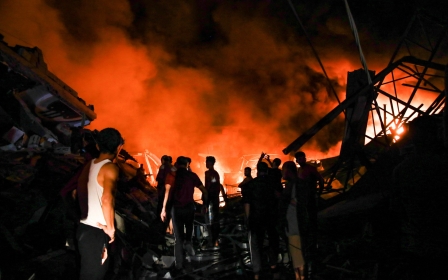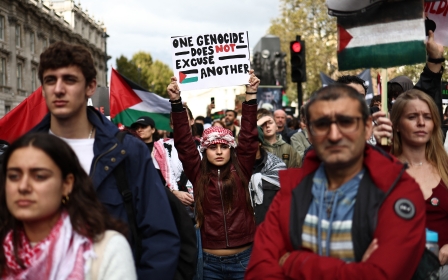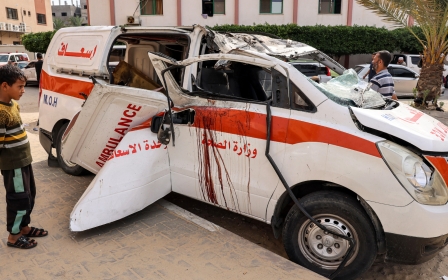Israel-Palestine war: UK medical staff forced to 'hide their grief' over Gaza assault
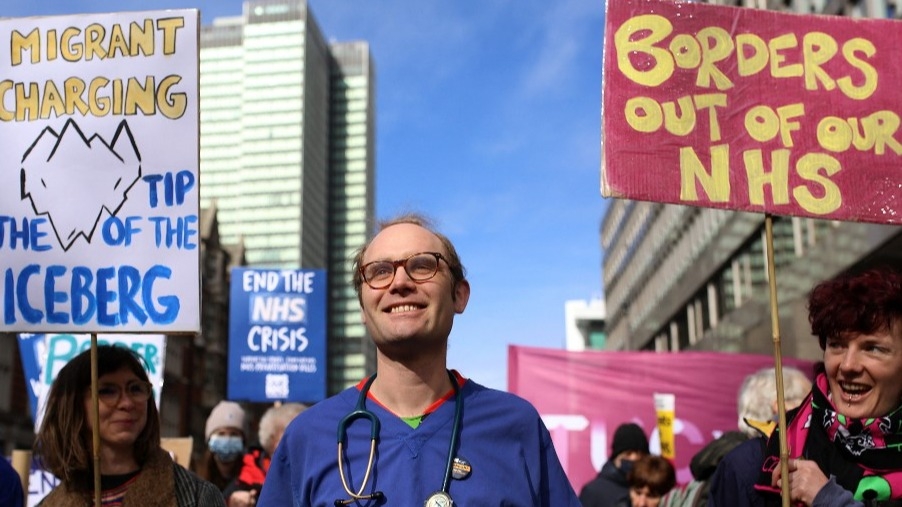
The last two weeks have been difficult for Mohamed Amir.
Between working 12-hour shifts as a doctor, Amir has spent the rest of his time worrying about friends and family trapped in Gaza.
"Growing up, we spent long summers in Gaza, playing with cousins, visiting aunties, eating musakhan, hearing stories from our elders," Amir told Middle East Eye.
Ancestrally Palestinian, his parents emigrated to Northern Ireland from Egypt in the 1980s so they could study medicine and train further as doctors. The move was meant to be temporary but soon became permanent, he said.
Determined to follow in the family tradition by becoming a doctor himself, Amir also saw the profession as a way to give back to the local community.
New MEE newsletter: Jerusalem Dispatch
Sign up to get the latest insights and analysis on Israel-Palestine, alongside Turkey Unpacked and other MEE newsletters
But since Israel launched its bombing campaign on Gaza after an attack on southern Israel by Palestinian fighters, the 35-year-old says debate around the conflict is being stifled by cancellations, threats and government rhetoric.
'I've been reluctant to speak out because the thought of getting referred to the GMC does cross your mind'
- Omar, medical doctor
Amir told MEE that his parents advised him not to speak out in support of the Palestinians in the event he was reprimanded by his workplace or faced accusations of antisemitism.
"There is a culture of fear within the NHS, and people are afraid to speak up and raise awareness of the situation in Gaza," he told MEE.
"The government is unapologetic in its support for Israel and I want to speak up because it’s my moral duty, but I am scared that it would come at the cost of my career and ability to help people."
Over the past fortnight, MEE has spoken to a number of doctors and medical staff from across the United Kingdom who are afraid of speaking up about the situation in Gaza.
Follow Middle East Eye's live coverage of the Israel-Palestine war here
As of Thursday, Israeli forces have killed at least 7,028 Palestinians in Gaza, including 2,913 children and 18,484 wounded. Several hospitals have also been attacked by Israeli air strikes.
Some medical workers who spoke to MEE said threats of being referred to the General Medical Council, guidelines set out by the Prevent anti-terrorism strategy, intimidation from the media, and statements made by the British government made them hesitant to speak up.
MEE has changed the names of individuals quoted in this story to protect their identity.
Many of those who spoke to MEE say the intimidation began when a social media account called @NHSWATCH1948 emerged and began urging people to report any healthcare workers who posted anything pro-Palestine.
Other accounts along the same lines also appeared online, including an account that encourages the public to report anyone posting pro-Israeli messages on social media.
While these accounts have now been deleted, the chilling effect lives on, said Jasmine Hijab, a doctor from the south of England.
"The minute you speak out on Palestine, there are people who will come on social media and say you should be referred to the General Medical Council which is a serious issue," said Hijab.
"They try to imply that you'll handle Jewish patients differently, but no one would ever do that. Saving lives is just part of what we do, and when you see innocent children dying it's mentally draining.
"Doctors are too afraid of the repercussions and mental stress because getting referred to the GMC is stressful, and I don't know how unbiased it is towards doctors with different ethnicities."
The General Medical Council is Britain's regulatory body responsible for ensuring the quality and safety of medical practitioners and medical education. Its purpose is to protect the public by setting medical practice and professionalism standards.
A referral to the GMC could mean a doctor is suspended or struck off. GMC investigations can last for months and during that time, depending on the type of investigation carried out, doctors can be suspended temporarily from working without pay, said Hijab.
'We should be addressing this head-on'
In recent years the GMC has been accused of racial bias. British judges in 2021 said the medical body was "infected" with racism when a court found it had discriminated against a doctor of Muslim and African heritage.
The GMC disputed the tribunal's claims with its chair, Clare Max, describing the outcome as "a flawed tribunal judgment [that] will not help achieve the aims we and others share to tackle inequalities".
Omar, a doctor from the Midlands, explained the potential ramifications that come from a referral to the GMC.
"When they threaten to refer you to the GMC, it's effectively saying that they are threatening your livelihood and all the work you do to help patients," said Omar.
"I've been reluctant to speak out because the thought of getting referred to the GMC does cross your mind.
'There is a genuine fear that exists within the medical community, and the hesitancy to talk about Palestine precedes Hamas'
- Ayo Moiett, junior doctor
"How much can you say without getting yourself in hot water? There are so many people who work in a hospital and the last thing you need is someone misconstruing your words and actions."
Five days after the Hamas attacks on 7 October and the Israeli government's decision to cut off water and electricity to Gaza, the Department of Health and Social Care (DHSC) said it stood "in solidarity with the people of Israel" and flew the Israeli flag on top of the department's building.
Some hospital trusts also sent letters to their staff acknowledging the unrest in Israel and Gaza without naming Palestine.
For Palestinian medics like Hana al-Nour, the fear of being reprimanded by the GMC and letters sent by her hospital trust have made her feel like she has had to "hide" her grief for the past two weeks.
"It definitely hurt when I received a letter from the chief executive of my hospital trust when it said they 'mourned the loss of civilian life in Israel and surrounding areas' like we don't exist," noted Al Nour.
"That phrase 'surrounding areas' really hit me, and at the time, I was hesitant to say anything, but given the hospital bombing, the killing of doctors, and everything that's transpired since, as healthcare workers who work in this space, surely we should be addressing this head-on."
Pro-Palestine versus pro-Ukraine
Amir echoed Nour's disappointment and said many doctors felt "hopeless", especially since many hospitals hosted fundraisers for Ukraine when the war broke out.
"If you look at it relative to the Ukraine war, it makes you wonder why Palestine is seen as so controversial because we've had fundraisers at the front of the hospital raising money for Ukraine, our screensavers had a pro-Ukraine image," said Amir.
"That kind of contrast makes you question the difference between that conflict and this one."
For other medics like Usman Gani, he believes that doctors and the NHS should keep out of politics to ensure it maintains its neutrality.
"We are doctors first and foremost, and politics can complicate and create false impressions on how you operate as a doctor or healthcare worker in the NHS," said Gani.
"That means keeping opinions, irrespective of whether they are about the Israel-Palestine conflict or Russia's invasion of Ukraine, to yourself."
But despite these concerns, 24 health professional groups within the UK have written to Prime Minister Rishi Sunak demanding "urgent action to halt the catastrophic humanitarian and medical crisis" unfolding in Gaza.
Thousands of doctors from across the UK have signed an open letter criticising the Department of Health and Social Care for its pro-Israel stance, calling on the department to recognise and condemn Israel's "war crimes".
Ayo Moiett, a junior doctor, was one of the more than 8,000 signatories of the letter. Moiett believes that "strength in numbers" and the scale of the "dire humanitarian crisis" are some of the reasons driving medical workers from various backgrounds to sign the letter.
"No doubt there is a genuine fear that exists within the medical community, and the hesitancy to talk about Palestine precedes Hamas, and many people are talking about that within the medical community," noted Moiett.
"But what we see with the open letter is that the sheer number of people signing up to it shows that strength in numbers has motivated many who have felt lost and sad about the situation in Gaza to speak up against these atrocities."
Refer thousands to the GMC?
Organisers of the open letter who spoke to MEE said they had received thousands of additional requests to sign it. They said it was taking time to add all the names because of checks to ensure everybody added works within the NHS.
Both Amir and Nour also signed the open letter and joined protests in central London while wearing masks to protect their identities.
"For me it's the sheer numbers of people who are signing the letter that made me sign it, even if it's just about changing public opinion then it's good enough. Because I can't imagine the government and NHS referring thousands of us to the GMC," said Amir.
"If they do, then the NHS will be struggling more than they already are right now."
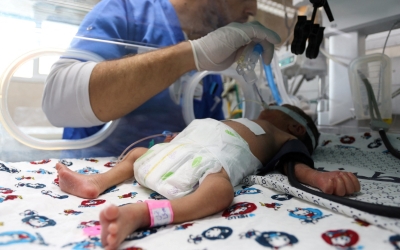
A Department of Health and Social Care spokesperson did not respond to the aims of the open letter but said: "We stand in solidarity with the people of Israel following the horrific terrorist attacks by Hamas."
They added: "Like many government departments, we flew the Israeli flag as a show of support for the Israeli people and the Jewish community here in the United Kingdom."
A spokesperson for the GMC told MEE late on Thursday that doctors are entitled to "their own political opinions" and that the organisation's focus is "on the effect that expressions of political or other personal beliefs may have on patients’ or public confidence in the profession.
"In sharing opinions and raising awareness around certain issues doctors must consider how doing so may affect the public’s trust and perception of doctors. This means doctors do not treat patients unfairly, do not deny patients access to appropriate medical treatment or services, and do not cause patients distress," the spokesperson said.
"Fitness-to-practice processes exist to fulfil our legal duty to assess whether there is any current and ongoing risk to patient safety. As with all complaints, we would make our decision on a case-by-case basis considering the specific facts of the individual concerned.
"Not every departure from the standards will be considered serious, and we always take context into account."
Middle East Eye delivers independent and unrivalled coverage and analysis of the Middle East, North Africa and beyond. To learn more about republishing this content and the associated fees, please fill out this form. More about MEE can be found here.



